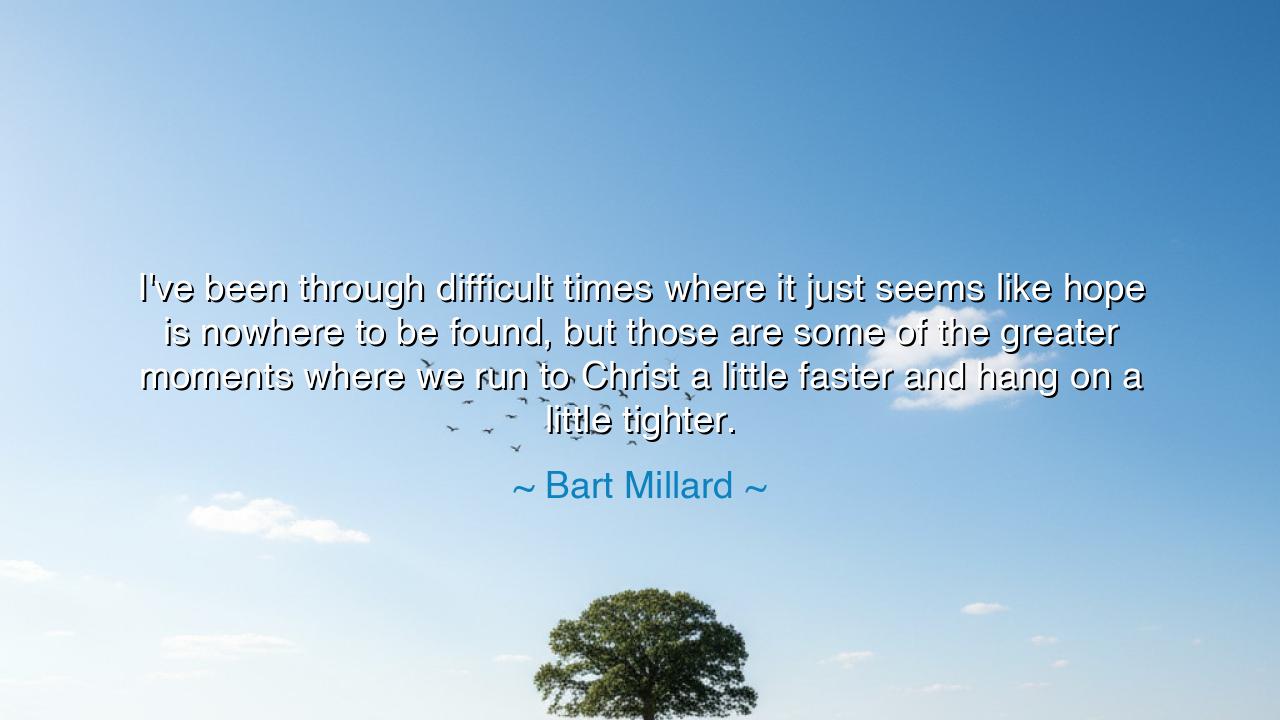
I've been through difficult times where it just seems like hope
I've been through difficult times where it just seems like hope is nowhere to be found, but those are some of the greater moments where we run to Christ a little faster and hang on a little tighter.






Bart Millard once said: “I've been through difficult times where it just seems like hope is nowhere to be found, but those are some of the greater moments where we run to Christ a little faster and hang on a little tighter.” These words, born not of theory but of deep personal pain, carry the fire of truth that can only be forged through suffering. Millard, the voice behind the song “I Can Only Imagine,” speaks from a heart that has known both despair and redemption. His quote reveals a sacred paradox — that it is often in the darkest hours of life, when the light of hope seems extinguished, that faith becomes most alive. For when all else is lost, the soul remembers its truest refuge: the embrace of Christ.
To understand his meaning, we must first face the nature of human suffering. There are seasons in life when the heart feels abandoned — when prayers seem to fall into silence, when dreams collapse like ruins, and when even breathing feels like labor. In such moments, hope appears to vanish, and despair whispers that God has turned away. Yet, as Millard reminds us, it is precisely then — when we have reached the end of our own strength — that we turn back to the eternal source of strength. We run to Christ a little faster because we have nowhere else to go, and in doing so, we discover that He was never far from us. The very weight of sorrow becomes the force that drives us closer to grace.
This truth is as old as faith itself. The ancient psalmists sang of it: “Out of the depths I cry to You, O Lord.” They too learned that the valley of despair is not a place of abandonment, but a holy ground where divine mercy meets human frailty. Even Christ Himself, in His agony on the cross, cried out, “My God, my God, why have You forsaken me?” — and yet, in that cry, redemption was born. Thus, Millard’s words echo this eternal pattern: that suffering refines faith, stripping it of pride and illusion, leaving only the pure, trembling trust that clings to God alone.
Consider the story of Corrie ten Boom, a Dutch woman who endured the horrors of a Nazi concentration camp. She watched her family die for their faith, yet in the midst of that hell, she wrote: “There is no pit so deep that God’s love is not deeper still.” Her hope was not found in circumstance, but in Christ. Like Millard, she learned that despair is not the end, but the threshold of a deeper encounter with the divine. When hope could not be seen, it had to be held by faith — and in holding it, she found unshakable peace. Such stories remind us that faith is not proven in times of ease, but in the furnace of affliction.
Millard’s insight also teaches a hidden mercy within pain. When life is easy, we grow complacent; we drift from prayer, trusting in our own strength. But in hardship, the illusion of control shatters, and the soul remembers its dependence on God. In that brokenness, humility is born — a humility that opens the heart to divine love. Running to Christ faster is not merely desperation; it is the soul’s instinctive return to its Maker. The tighter we cling, the more we discover that He has been holding us all along. It is not we who preserve faith through struggle, but Christ who preserves us through faith.
There is also a quiet heroism in these words. To hold on to hope when hope seems gone — that is the victory of the spirit. The world often glorifies strength in conquest, but true strength is found in endurance, in the trembling hand that still reaches for God when the storm rages. Every believer who refuses to surrender to despair becomes a beacon for others — living proof that faith can outlast fear. Thus, Millard’s testimony is not merely personal; it is universal, speaking to every soul that has ever walked through darkness and dared to keep believing.
Let this, then, be the lesson: when hope seems lost, do not stop running — run faster. When faith feels weak, cling harder. When you cannot see God, trust that He still sees you. Pray even when words fail, for prayer itself is the language of hope. And when the storm has passed, remember that the closeness you found with Christ in the valley will be the treasure that carries you through the next. For it is in the very moments when we think we are breaking that we are being drawn deeper into divine strength.
For truly, as Bart Millard’s words remind us, the hardest times often bring the holiest encounters. Hope is never truly gone; it merely hides behind the clouds of fear, waiting for faith to call it forth. And when we run to Christ and cling to Him, we find not only the courage to endure, but the peace that passes all understanding. So hold fast, even in the storm — for in the struggle to hang on, the soul learns the greatest secret of all: that the arms we cling to have been carrying us from the very beginning.






AAdministratorAdministrator
Welcome, honored guests. Please leave a comment, we will respond soon